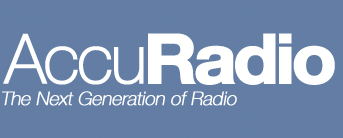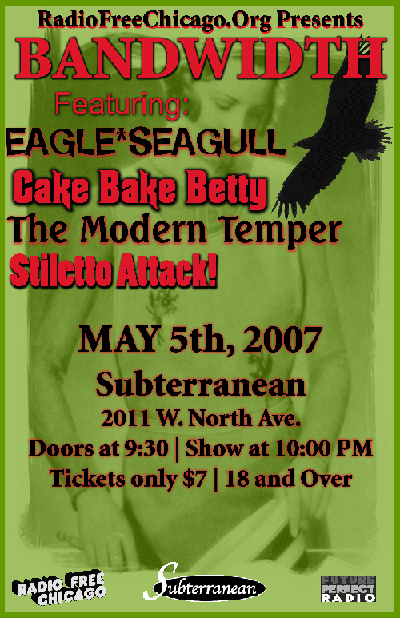| « The Sound Of All The Things You Aren't | Morning Music Links » |
Feature Thu May 03 2007
The Plight of Internet Radio, Or, The Loudest Silence You've Ever Heard
On March 2, after more than a year of hearing testimony from webcasters and SoundExchange (a non-profit organization created by the RIAA to collect and distribute royalties from satellite and online radio stations), the Library of Congress' Copyright Royalty Board (CRB) decided to increase the royalties paid to artists and record labels, effective May 15. It is a decision that could end online radio, as we know it, in the United States and it's a decision that has many webcasters wondering if they'll be silenced.

For the Chicago-based AccuRadio, the proposed royalty rates will hit the station hard. As one of the granddaddies of internet radio stations, AccuRadio hosts more than 200 channels, focusing on everything from Broadway tunes to ‘80s one-hit-wonders, and pulls in nearly a million listeners per month.
Up until the CRB's decision, royalty rates for online radio stations were based on a percentage of a station's gross revenue, which usually amounted to about 10-12 percent for smaller webcasters. The CRB's new rates call for webcasters to pay $500 minimum per channel (which includes the thousands of personal stations found at Live365.com and Pandora.com), and pay the new $.0011 per-song rate. The rates will nearly double to $.0019 per song played in 2010.
Thousandths of a cent might seem like small potatoes, but what this means is for a station like AccuRadio, it would need at least $100,000 to operate its different channels, on top of the per-song rate it would also have to pay. Oh, yeah, and the new per-song rate is retroactive to 2006, when the discussions began. So come July 15, when the retroactive fees are due (a fluke extension from the original deadline, which buys some time for webcasters), AccuRadio will owe thousands more.
James Kenler, who co-owns the local label Flameshovel Records, disagrees with the CRB's assessment, citing Internet radio as one of the few promotional avenues available to lots of lesser-known and developing acts.
And Kenler should know—Flameshovel is one of indie music's success stories, with its roster of Chicago bands like Chin Up Chin Up, Make Believe and Russian Circles receiving national audiences, partly due to attention given by independent radio.
"Large-scale commercial and terrestrial radio continue to exist via one form of direct or indirect payola, cutting off the public's access to newer and more interesting music unless it bares the stamp of approval and funding of the major record industry's machine," Kenler said.

As the May 15 start date for the new royalty rates approaches, AccuRadio's Paul Maloney admits there is no contingency plan. While some smaller, personal internet stations have discussed approaching labels and artists directly to sign waivers to allow them to bypass the new rates and play the music, it's simply beyond the scope for larger stations like AccuRadio, whose small staff maintains a library of thousands of albums.
But all hope is not lost quite yet. Late last month, U.S. Rep. Don Manzullo (R-IL), along with Rep. Jay Inslee (D-WA), introduced The Internet Radio Equality Act—a bill, if it is passed, will apply the same royalty-rate standard to internet radio, as well as satellite radio, cable radio and jukeboxes.
"[The bill] gives us a chance to survive," Maloney said. "It's really clean and concrete, so both webcasters and listeners can get behind it."
For Rep. Manzullo, an avid music fan whom once played bass in a band as a younger pup, his proposed legislation not only protects the "innovative little guys," but the Northern Illinois constituents he serves.
"I represent a large rural area in Illinois that doesn't have the same type of access to quality broadcast radio as the urban areas," Manzullo said via e-mail last week. "Internet radio has leveled the playing field somewhat for our rural residents who would have few, if any, radio options if music ends on the web."
Right now, the bill is still in committee, so earlier this week, webcasters traveled to Washington to ask Representatives to pressure House Judiciary and House of Energy and Commerce committee members to ensure the Internet Radio Equality Act gets a vote. Meanwhile, the SaveNetRadio campaign is also encouraging its listeners to contact their representatives directly.

Locally, Accuradio's Dan McSwain, who also programs the station's indie rock channel, Future Perfect Radio, said the response from representatives has been positive.
U.S. Rep. Luis Gutierrez (D-IL), whose district covers the Wicker Park, Bucktown and Logan Square neighborhoods, told SaveNetRadio that its campaign has generated more correspondences to their office in the last few weeks than any other issue, including a large number of calls coming from the artists themselves (local bands Mittens on Strings, The Bitter Tears and Gamine Thief are among the bands who have vocalized its support).
In a meeting with Sen. Barack Obama's office earlier this week, it was also reported to SaveNetRadio its campaign was the number one issue in the last week as far as volume of correspondences.
Even despite the support that seems to be benefiting the campaign, the impact of the upcoming royalty hike probably won't really sink in until May 8, when dozens of online radio stations, including AccuRadio, will go dark and participate in a Day of Silence. And while it won't exactly be the day the music died, it will be pretty close to it.

As part of its monthly Bandwidth series, Radio Free Chicago and Future Perfect Radio will present a SaveNetRadio.org event on Friday, May 5, at Subterranean, 2011 W. North Ave. Appearing will be Eagle*Seagull, Cake Bake Betty, The Modern Temper and Stiletto Attack. SaveNetRadio representatives will be on hand to provide more information on how to contact your Congressional representative. The show starts at 10pm, and tickets are $7. 18+.















